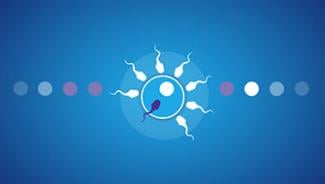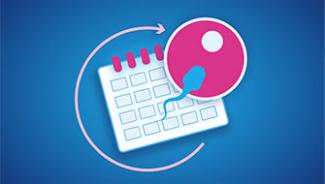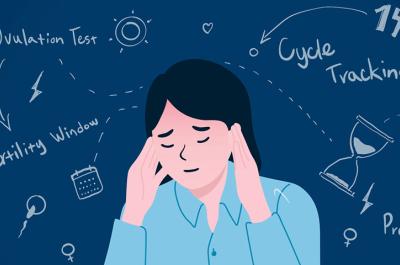Does stress affect your chances of getting pregnant?

You may have heard that being stressed out can affect your chances of getting pregnant, but how true is this? Well, there is some evidence that athletes and women with low hormone production, like women with eating disorders, have higher levels of the stress hormone, cortisol, which can affect their ability to release an egg. However, we’re talking unusually high levels of stress here, or maybe chronic stress (more on that below) not the daily anxiety we can all feel when preparing for an important meeting, missing the bus, or dealing with a drama in our family or social life. Even the additional stress we are experiencing during the coronavirus pandemic is, for most people, still what scientists would consider normal. If you want to know more about stress and how you can manage it, then take a look at the Mental Health America website.
We’re going to talk about whether stress affects fertility and what that means for you.
What is stress and what does it do to your body?
Deadlines, travel, family problems, speaking in public, exams, and even preparing a meal for someone important—all of these can cause stress. It’s a highly individual thing, as something that may stress you out may not stress your partner or best friend, and perhaps what stresses them won’t even faze you. However, even though the cause of stress is highly personal, surprisingly our bodies reacts to that stress in the same way. You can think of it as your fight-or-flight response, and it’s your body’s way of handling challenging situations. When you’re stressed your body goes through:
- hormonal changes (including increased cortisol)
- respiratory changes (you might notice irregular breathing patterns)
- cardiovascular (e.g. a racing heart)
- nervous system changes (some people report shaking or sweating in moments of stress)1.
You know that feeling when your palms sweat, your heart rate goes up, and you breathe a bit more rapidly? That’s your body’s response to stress. It can also give you a burst of energy (thanks to the hormone adrenaline1). It’s not nice, but it’s why our ancestors survived. Stress helped us flee dangerous situations.
But, there is a downside to high levels of stress, especially chronic stress. Normally, once the thing that causes you stress is no longer a risk to you, your body resumes a normal state, but if there are stressors that are always present, then your body remains in a constant state of fight-or-flight. For example, if you’re under a lot of pressure at work and struggling with trying to stay on top of everything over a long period, or if you already have a very busy family life with lots of pulls on your time, stress can affect not only your emotional and mental health, but also your physical one. Chronic stress symptoms include:
- headaches
- sleep disruption
- muscle tension
- digestive issues
- changes in sex drive
- high blood pressure2
The good news is the stress that most of us experience in our life can be managed with relaxation techniques, exercise, a healthy diet, and even with help from a therapist. For those who feel overwhelmed with feelings of stress we recommend that you speak to your healthcare provider – feeling stressed is much more common than many people think, and they will point you in the direction of information and help.
Now, you may be wondering what the above has to do with fertility?
How may stress affect fertility?
You may have heard that stress can affect your chances of getting pregnant and that all you need is a break from the pace of your normal routine, for example a relaxing weekend in the countryside or a tropical vacation to unexpectedly find out you’re pregnant.
The truth is a little stress from time to time shouldn’t affect your fertility, but there is some connection between extreme levels of chronic stress and fertility.
When you’re suffering from serious chronic stress two things can happen that can affect your chances of getting pregnant:
- A decreased sex drive
- Anovulation
A decreased sex drive can be distressing, especially if you are trying for a baby, and there is an obvious reason: You are not in the mood to have sex, so you’re not having enough sex to get pregnant.
Anovulation, when you do not release an egg, on the other hand, is more complicated. If you’re not ovulating, you can’t get pregnant. Chronic or extreme stress can actually disrupt ovulation.
But why? Well, ovulation depends on two hormones that are produced in the pituitary gland—follicle-stimulating hormone (FSH) and luteinizing hormone (LH) . Excess physical or emotional stress can affect the pituitary gland and disrupt the production of these hormones, so the egg doesn’t get released.
And, it’s not only excess mental stress that does this, but physical stress to the body, like too much exercise, can also stop ovulation.
Stress and trying for a baby
Trying to conceive (TTC) can eventually be a stressful time for many couples and the stress is most likely to come from the failure to become pregnant after several months. Some women or couples put pressure on themselves to get pregnant because it’s so important for them. Take a look at Clearblue’s Conceivinghood campaign to read and share your story with others.
Although it’s perfectly normal for it to take time to get pregnant, as months pass without seeing that positive line on the pregnancy test, couples can start to feel the pressure of TTC.
Then there’s the stress that couples may feel from having frequent and timed intercourse while trying for a baby. Some may link the stress of TTC to infertility, but it could just be as simple as not knowing when to have sex, which is why taking an ovulation test may help.
How ovulation tests can help take the stress out of trying for a baby
Ovulation tests can actually help you by accurately indicating when you’re going to ovulate. This makes it easier to plan when to have sex so you can conceive. Some people believe that focusing on timed intercourse can be more stressful, but others say having this information helps them feel more in control and able to be pro-active about TTC.
A study by Professor William Ledger and Clearblue® in 2013 showed that using these tests was not any more stressful than trying for a baby without them3. In fact, among the sample of women included in the study 77% more women got pregnant in the test group who used ovulation tests, than in the group who didn’t use them
The Bottom Line
Chronic or extreme stress can play havoc with your body, it may affect your health, and can impact your fertility and chances of getting pregnant. It’s important to take care of yourself and reduce your stress levels if you can, but stress shouldn’t directly affect your ability to get pregnant, it’s the indirect effects, like decreased libido and anovulation which may have an impact.
Ovulation tests take the guesswork out of knowing when’s the right time to have sex, and contrary to past myths, using ovulation tests is no more stressful than trying to conceive without them. Always talk with your doctor or therapist if chronic stress is a concern, but please know, ordinary day to day stress – even some pandemic stress – is perfectly normal in your TTC journey.

Looking for insights on your health journey? Clearblue® sends you curated, science-backed articles right to your inbox.
- https://www.hormone.org/your-health-and-hormones/glands-and-hormones-a-to-z/hormones/adrenaline
- https://www.webmd.com/balance/stress-management/what-is-stress & https://my.clevelandclinic.org/health/articles/11874-stress
- Tiplady S., et al. Human Reproduction. (2013) 28(1): 138-151.

Get pregnant naturally
Ovulation tests are accurate and simple to use.

When is the best time to get pregnant?
There are only a few days each cycle, around ovulation, when a woman is fertile. Knowing these days can maximise your chance of conceiving.






